19 Oct

Search for “how to promote your blog,” and you’ll see hundreds of strategies.
But not all of them work. Believe us—we’ve tried them.
These are the seven that have worked for us.
People are more likely to share content with unique insights. Data, experiences, opinions—anything they can’t find elsewhere.
Here’s an example that illustrates this. In 2015, our chief marketing officer, Tim Soulo, wrote a guide to strategic writing on his personal blog. He crammed everything he knew and thought he created a masterpiece.
Yet, when he asked marketing influencer Rand Fishkin to tweet the post, this was how Rand responded:

A few years later, Rand retweeted our post on podcast advertising without any prompting:
What was the difference?
In Tim’s post, he rehashed the same advice from other articles on the topic. No doubt it was useful, but nothing was unique. In the latter article by our Rebekah Bek, everything was solely based on experience.
I’m not going to simply just tell you to create “unique content.” You must have heard it a hundred times by now. So rather than repeating the same old advice, I recommend building share triggers instead.
Coined by professor Jonah Berger in his book, “Contagious,” share triggers are psychological principles that make people want to share something. They are:
- Social currency – People share things that make them look good to others.
- Triggers – People share things that are top of mind.
- Emotion – People need to feel something to share something.
- Public – People tend to imitate others’ behavior if they can see or observe it.
- Practical value – People like to pass along practical, useful information.
- Stories – People don’t just share information—they share stories too.
Here’s how to put them into action (you’ll want to incorporate at least one or two):
- Make your content practical – Create something the reader can use right away. For example, our suite of free tools generates a lot of links and shares.
- Make your content opinionated – Give the reader something new to think about. Tim’s rant on email outreach and our post on podcast advertising are some examples of opinionated content.
- Evoke emotion – People used to share Upworthy articles because those made them feel awe, surprise, and happiness. Appealing to these emotions—alongside negative ones like anger and sadness—can compel people to share more.
- Make your content visual – Visual content makes consuming content easier, thus increasing the likelihood that someone will share it.
- Make your content newsworthy – Journalists and bloggers are constantly on the lookout for stories to cover. Data is one type of story. So if you have unique data to share, create a piece of content around it.
- Tell a story – Humans love telling and sharing stories. A good story that captures people’s attention can lead to more shares.
- Include what other people are sharing – If people are sharing and linking because of certain reasons in competing pages, we can assume that those reasons are important to that topic.
For the final tip, here’s how you can find out why people are linking:
- Go to Ahrefs’ Keywords Explorer
- Search for a topic you’re writing about
- Look at the SERP overview
- Find a similar article with lots of referring domains
- Click on the number in the Backlinks column
- Skim the Anchor and target URL column for commonalities
For example, if we analyze this post on the perfect kettlebell swing, we see that people are linking because of the benefits:
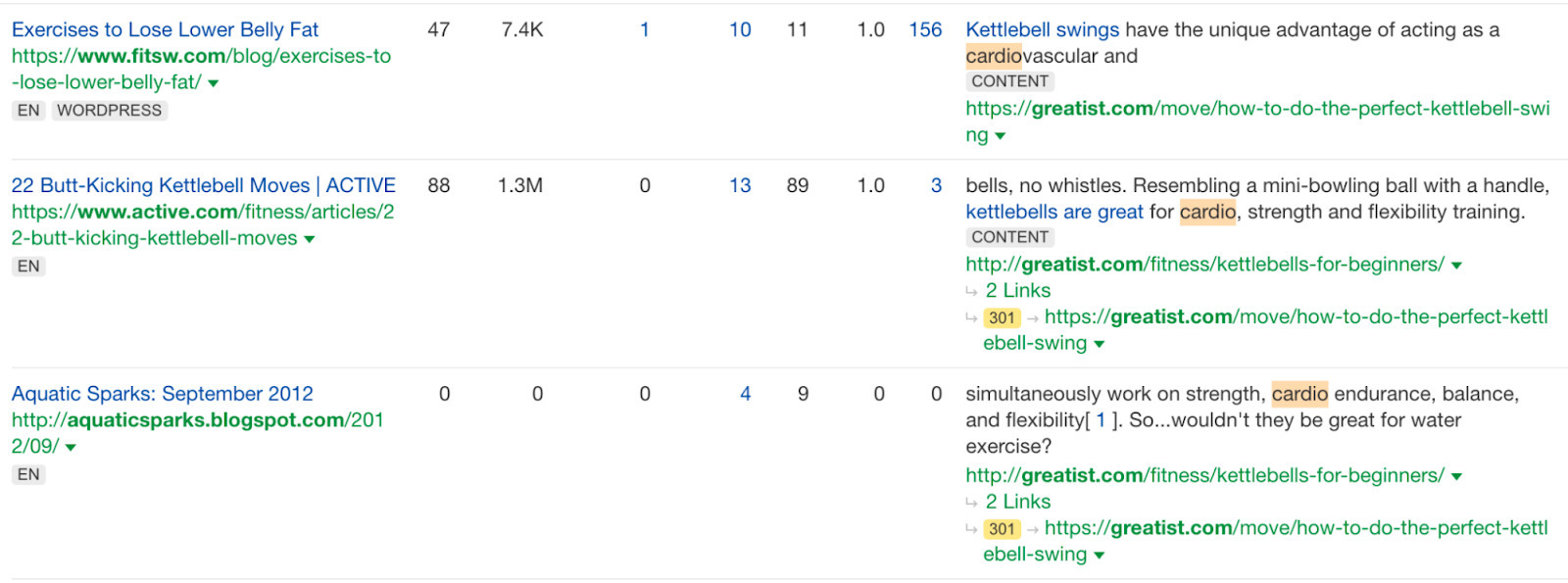
It’s something we can consider adding to our content.
Learn more: What Is Link Bait? 7 Successful Examples
You want traffic from Google. But if you’re new to the game, many topics are out of your reach—at least for now. They’re too competitive, and you’re outgunned by websites with more resources.
But what if I tell you that you can find topics that are easy to rank for? Here’s how:
- Go to Ahrefs’ Content Explorer
- Search for a relevant term (e.g., “beards”)
- Add a Referring domains filter to max. 10
- Add a Page traffic filter to min. 500
- Add a Domain Rating filter to max. 30
Since backlinks are an important ranking factor, pages that still get tons of search traffic without plenty of backlinks should be relatively easy to rank for.
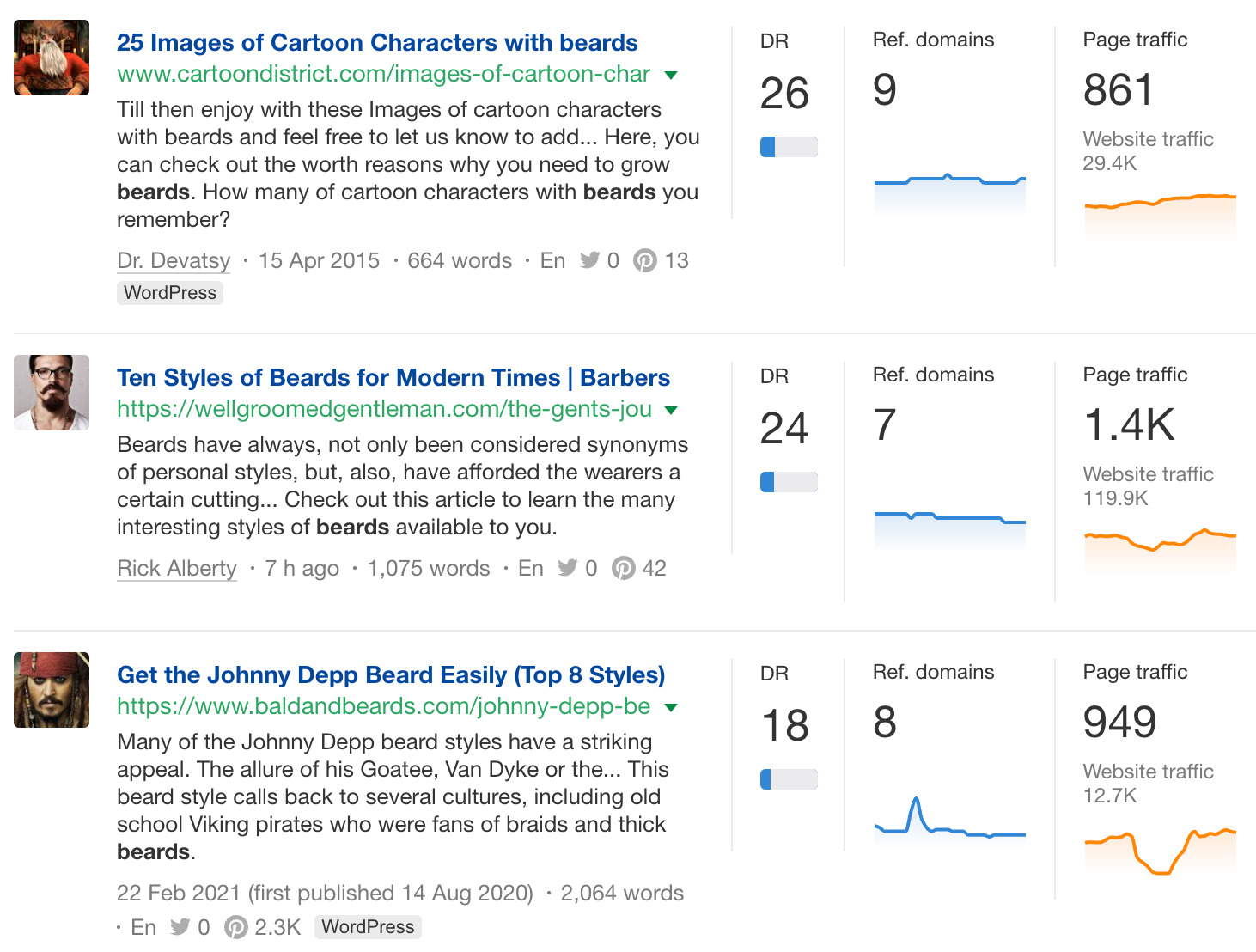
In this example, you’ll see >2,000 pages that get >500 search traffic a month with fewer than 10 referring domains.
Click on any article and then on the Organic keywords tab to see what keywords they’re ranking for.
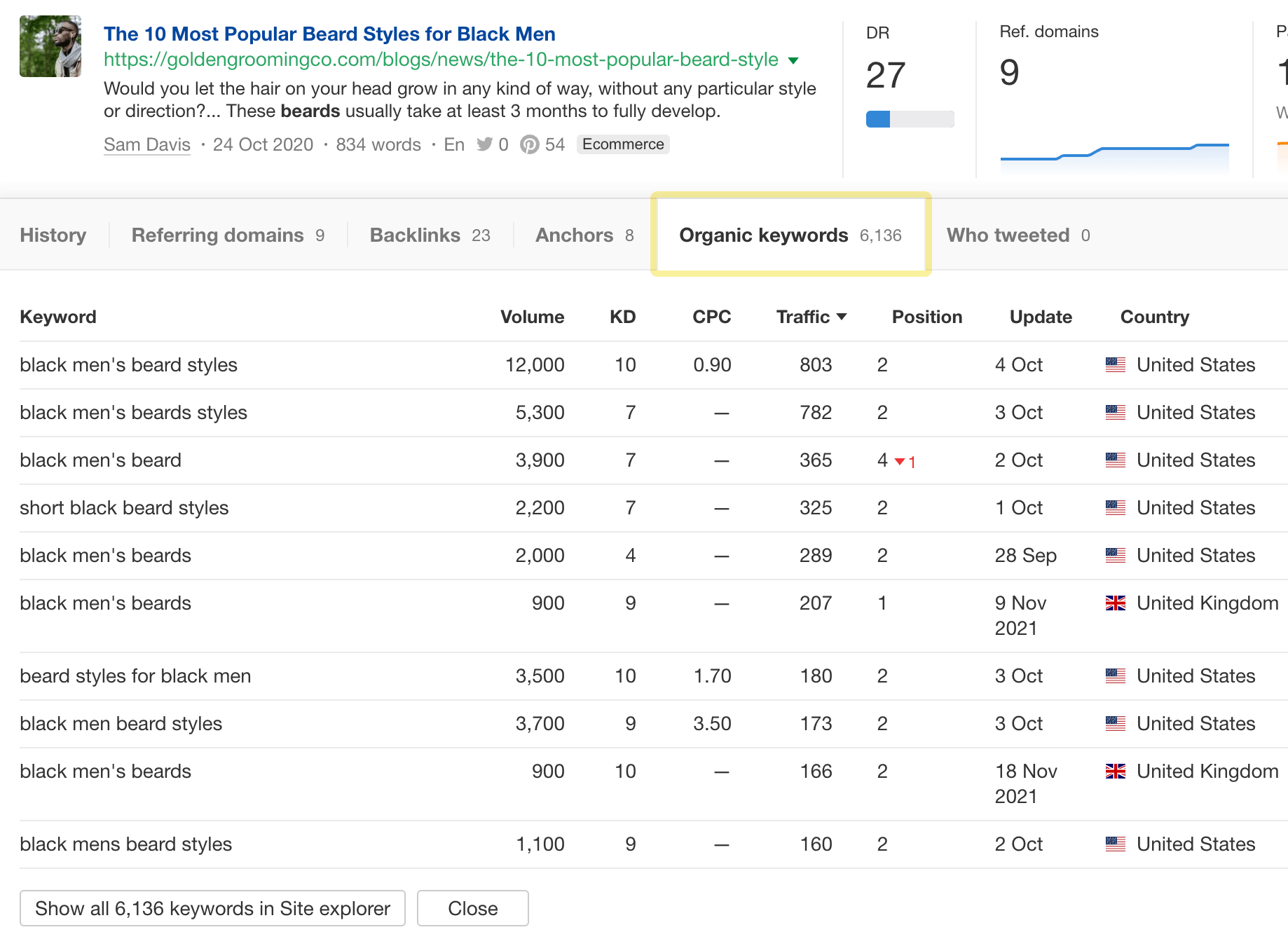
If you’re running a blog about beards, you can target the same topics too.
Learn more: How to Find Low-Competition Keywords for SEO
If you’ve published an amazing piece of content, why not show it to people in your niche who have a large audience?
It’s why Tim reached out to Rand. In digital marketing, we call this “outreach.”
The key to successful outreach is to ask yourself this question each time you’re about to send a new email:
Why would anyone care about whatever I say?
There are two strong outreach reasons:
- You mentioned that person (or their work) in your article.
- Your article has something groundbreaking that this person doesn’t know about but is genuinely interested in.
The latter reason is why strategy #1 works. There’s no trick to getting top people in your field to promote you. You have to do notable work.
This is also why whenever we send outreach emails to promote our content, we focus on pitching the article—not a sneaky request to tweet it.
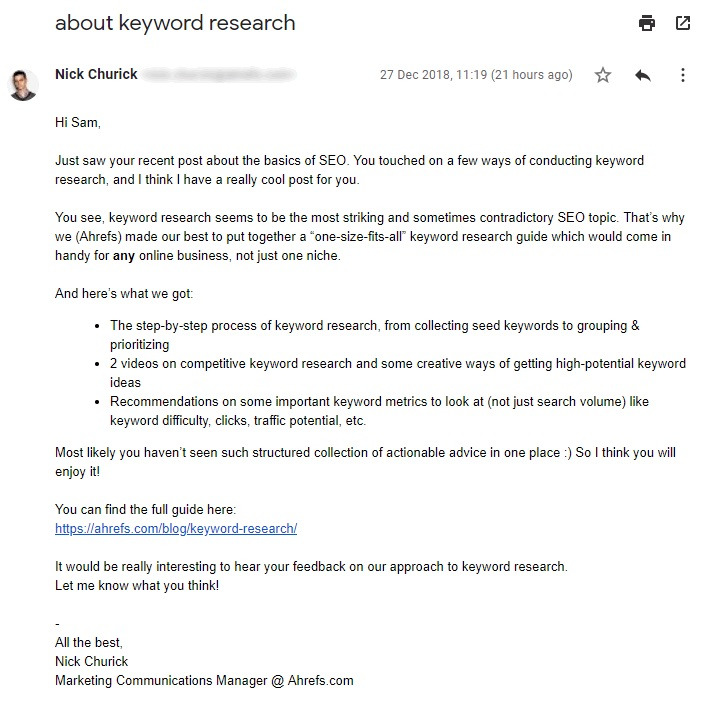
Assuming you’ve created something noteworthy, here’s how you can find people to potentially reach out to:
- Go to Ahrefs’ Content Explorer
- Search for your topic
- Click on the Authors tab
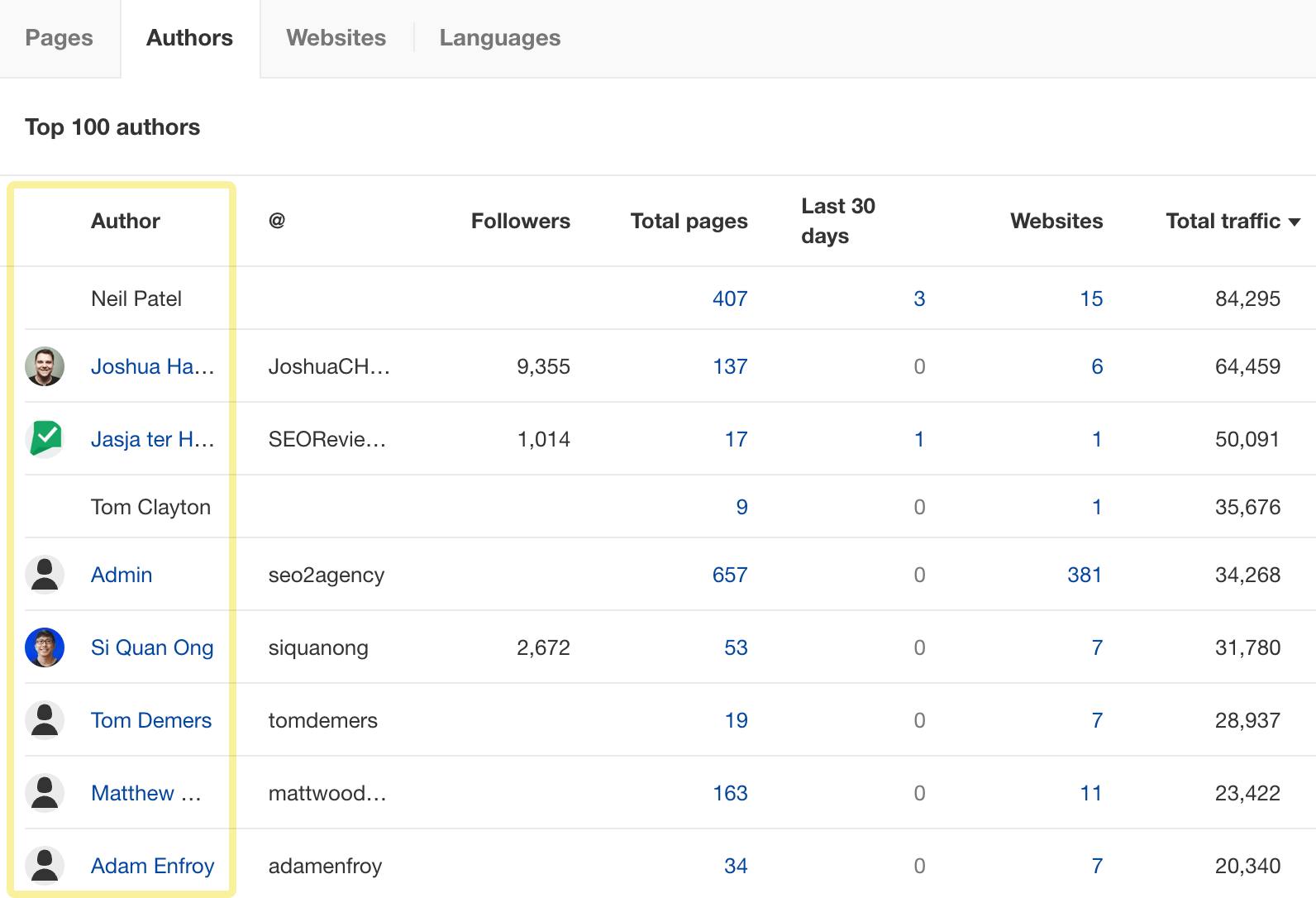
These 100 people have written many articles on your topic, so it’s reasonable to assume they’re interested. Find their emails, reach out to them, and share your unique insights.
Learn more: Blogger Outreach: How to Do It at Scale (Without Feeling Like a Jerk)
Here’s another strong reason you can use for your outreach: You noticed someone’s blog post is declining in traffic, so you offer to help update it.
In fact, this was what Irina Maltseva, the former head of marketing at Hunter, did:
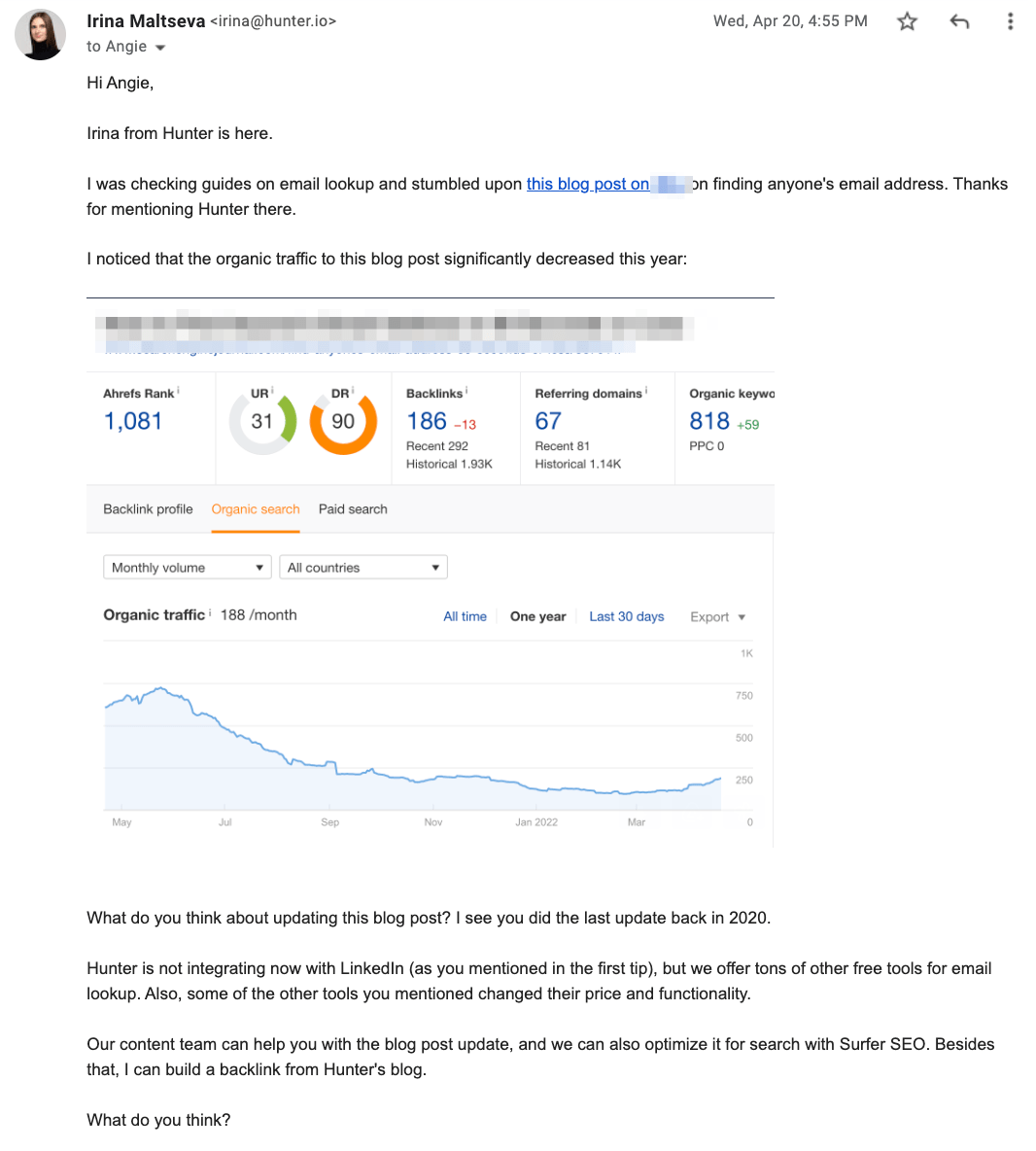
Why does this work? Four reasons:
- It is important to update older content—you don’t want outdated information, and updated content helps boost search traffic.
- Keeping track and updating old content are burdensome tasks. By offering to update old content, you’re offering to take it off their hands.
- While guest blogging is a legitimate way to drive traffic, you’re oftentimes “guessing” the kind of topics they’re interested in. But you don’t need to guess if you’re updating their old content.
- They’re more than likely to allow you to link back to your site and/or your content.
Here’s how you can find content that’s declining in traffic:
- Go to Ahrefs’ Content Explorer
- Search for your topic
- Set the Trends dropdown to Last year
From here, you’ll want to eyeball the list and look out for pages with declining page traffic:
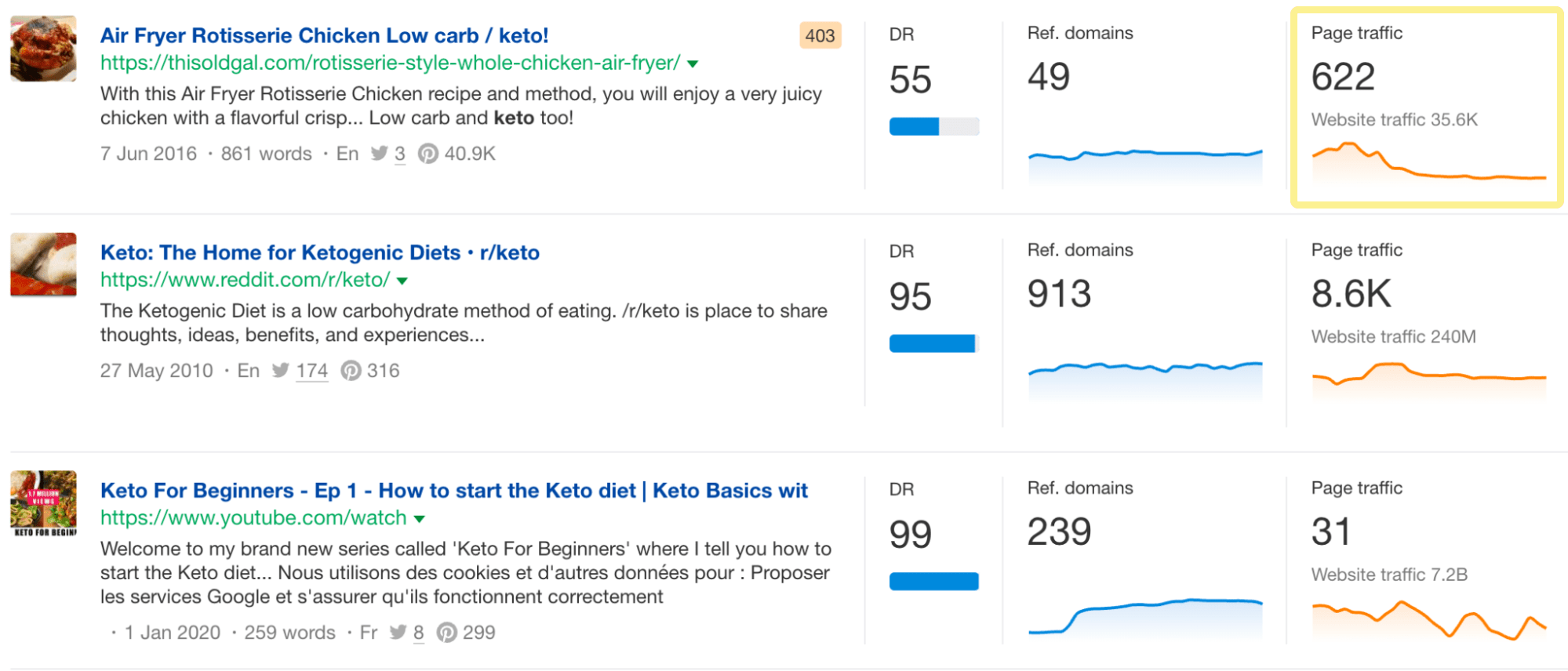
Click on the article to see the Page traffic chart in detail:
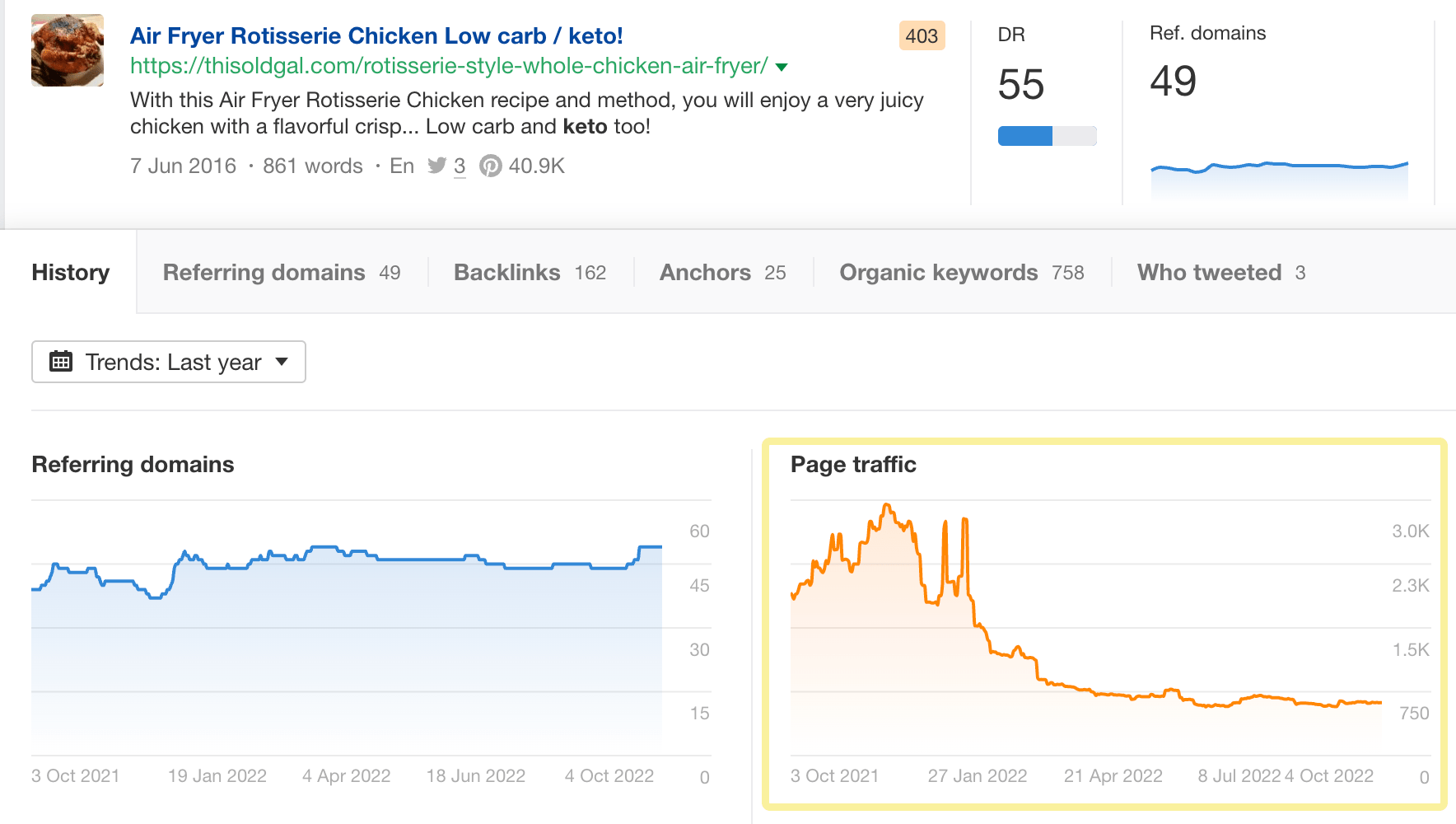
Looks like this particular article has suffered a drastic drop in traffic. If you’re in this niche, you can reach out to the editor and see if they’ll be interested in updating the post. If they are, suggest doing the work for them—it’ll sweeten the ask.
Learn more: Republishing Content: How to Update Old Blog Posts for SEO
There is a subreddit for almost anything. That includes your niche too. There’s no doubt that Reddit is a great place to promote your content. Do it right, and it may even lead to a hug of death.
But let me throw a wrench in your plans. Redditors hate advertising and marketing. If your content smells like self-promotion, they will not hesitate to throw you out.
So you can’t just waltz in, drop a link, and wait for the flood of traffic.
Reddit, however, does love useful content. So to resolve this conundrum, you can share a barebones version of your content. Strip everything out, especially your internal and external links. Leave only a link back to the original at the bottom of your Reddit post, so anyone who’s interested can check it out.
Here’s an example of it in the wild:
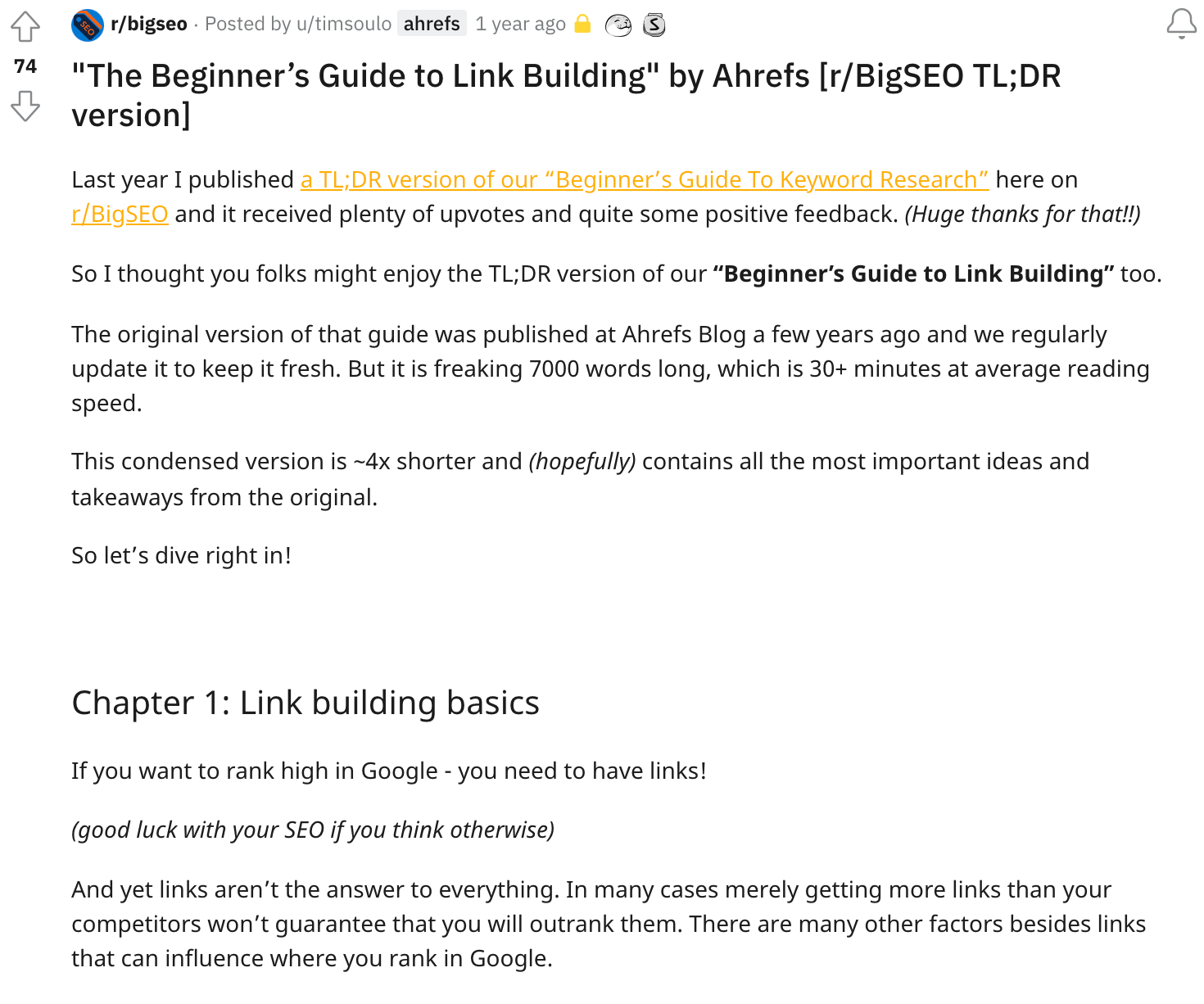
We have a video on blog post templates you can swipe. But did you know that it was originally a blog post?
Not everyone wants to read. Some want to watch videos. By turning your articles into videos, you can potentially reach a new set of audience.
You’ve already created the content anyway. Why not take advantage of it and give it a new lease on life?
Let’s be honest, though. Repurposing is hard work. It’s one thing to say, “Turn your blog post into a video,” and another to actually do it. So if you’re going down this path, you’ll have to prioritize.
One way to do this is to focus on topics that people are already searching for on YouTube. That way, your repurposed videos can generate search traffic too.
Here’s how to find these topics:
- Go to Ahrefs’ Keywords Explorer
- Select YouTube
- Enter a few relevant keywords
- Go to the Matching terms report
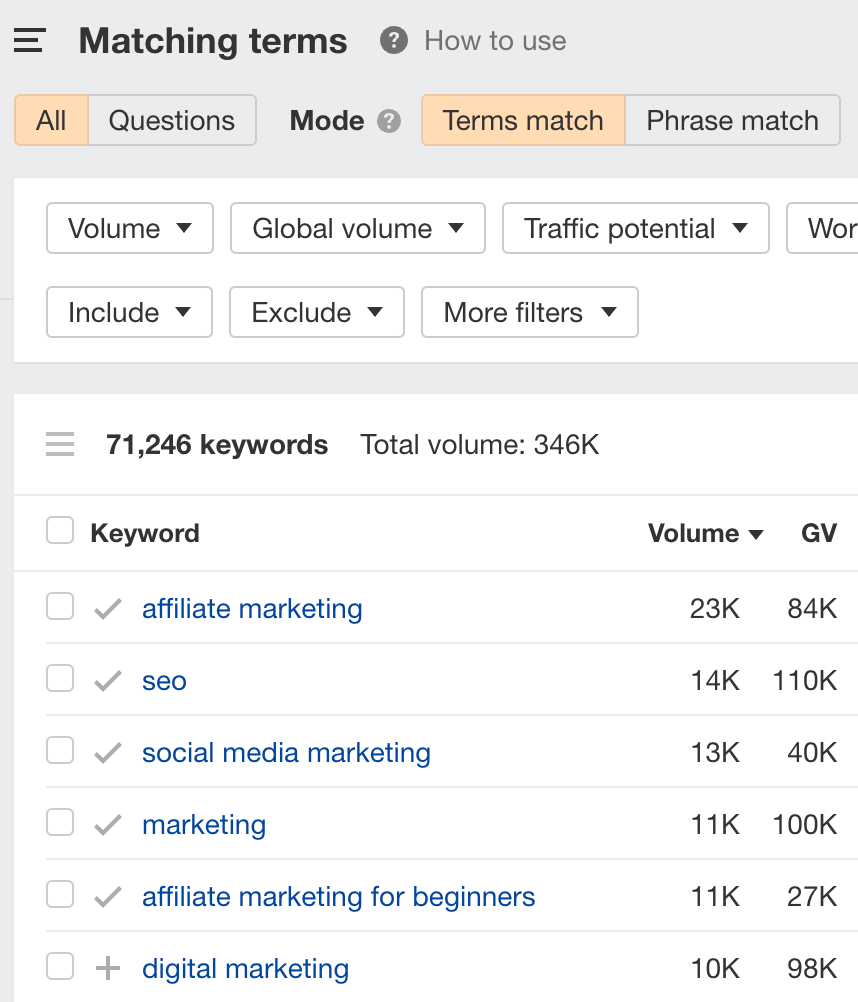
Look through the list to see if there are any topics where you already have existing blog content. Those are the topics you should repurpose.
For example, this was how we decided to repurpose our article on influencer marketing:

Learn more: The Complete Guide to Content Repurposing
Most people who are looking for ways to promote their blogs are actually looking for free promotion strategies. They don’t want to pay for promotion because they think they have no budget for it.
But what they don’t realize is that, in reality, no blog promotion method is free. While it may not cost upfront cash, it takes time. And time is money. Even the richest person in the world cannot buy time.
So you actually do have the budget to promote your content with ads because they free up your precious time—time that could be better spent elsewhere.
At Ahrefs, we run ads for all our newly published content. Facebook ads are our go-to:
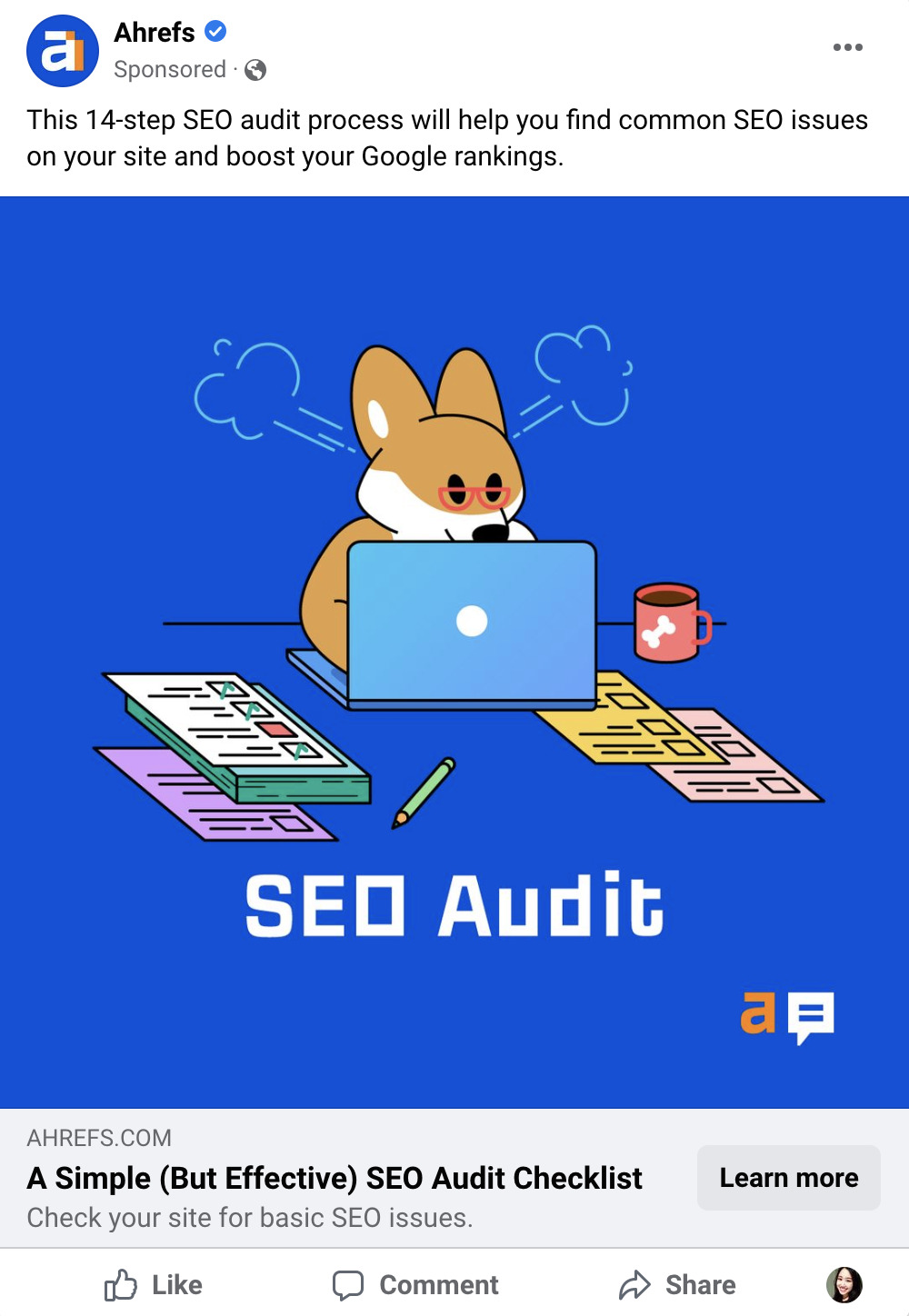
If you find Facebook ads too complex or too expensive, don’t forget that there are other platforms you can test too. For example, we also run ads on Quora:

And Twitter:
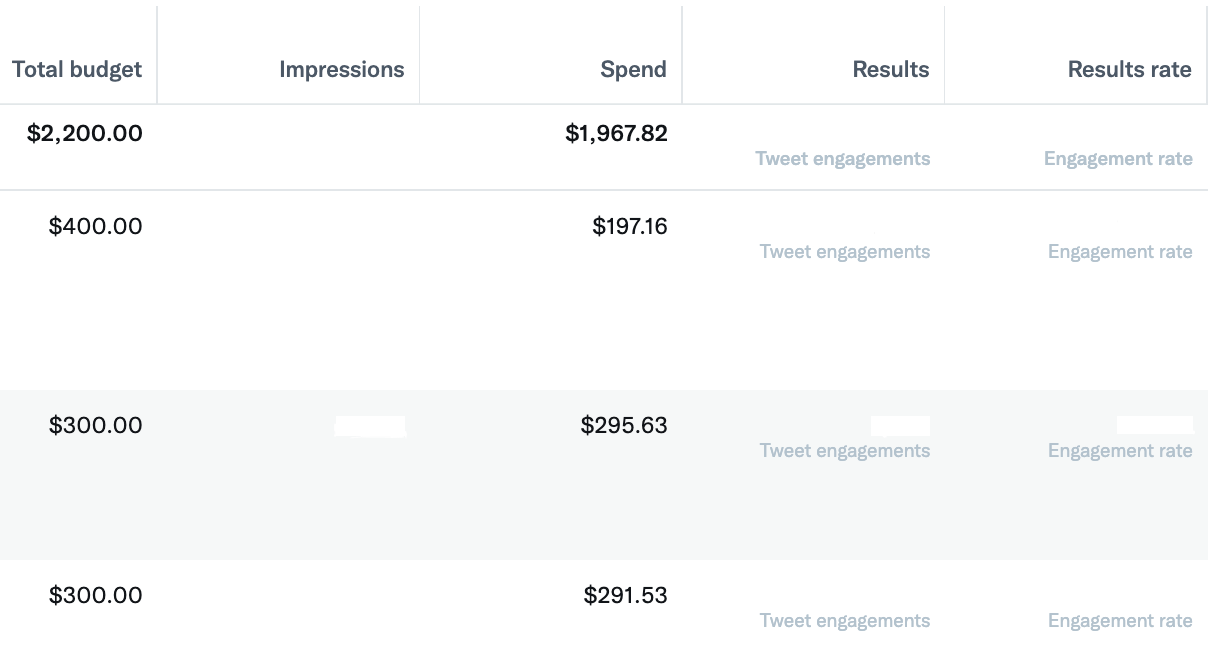
Learn more: PPC Marketing: Beginner’s Guide to Pay-Per-Click Ads
Final thoughts
Ryan Holiday writes in “Perennial Seller”:
Creating more work is one of the most effective marketing techniques of all.
If you’ve published an amazing article and got tons of success, the best thing you can do to promote your blog further is to publish another amazing piece of content.
A consistent output of great work is the foundation behind all your blog promotion strategies. It supercharges everything.
Any questions or comments? Let me know on Twitter.
Source: ahrefs.com, originally published on 2022-10-19 01:00:00
Connect with B2 Web Studios
Get B2 news, tips and the latest trends on web, mobile and digital marketing
- Appleton/Green Bay (HQ): (920) 358-0305
- Las Vegas, NV (Satellite): (702) 659-7809
- Email Us: [email protected]

© Copyright 2002 – 2022 B2 Web Studios, a division of B2 Computing LLC. All rights reserved. All logos trademarks of their respective owners. Privacy Policy

![How to Successfully Use Social Media: A Small Business Guide for Beginners [Infographic]](https://b2webstudios.com/storage/2023/02/How-to-Successfully-Use-Social-Media-A-Small-Business-Guide-85x70.jpg)



![How to Successfully Use Social Media: A Small Business Guide for Beginners [Infographic]](https://b2webstudios.com/storage/2023/02/How-to-Successfully-Use-Social-Media-A-Small-Business-Guide-300x169.jpg)


Recent Comments